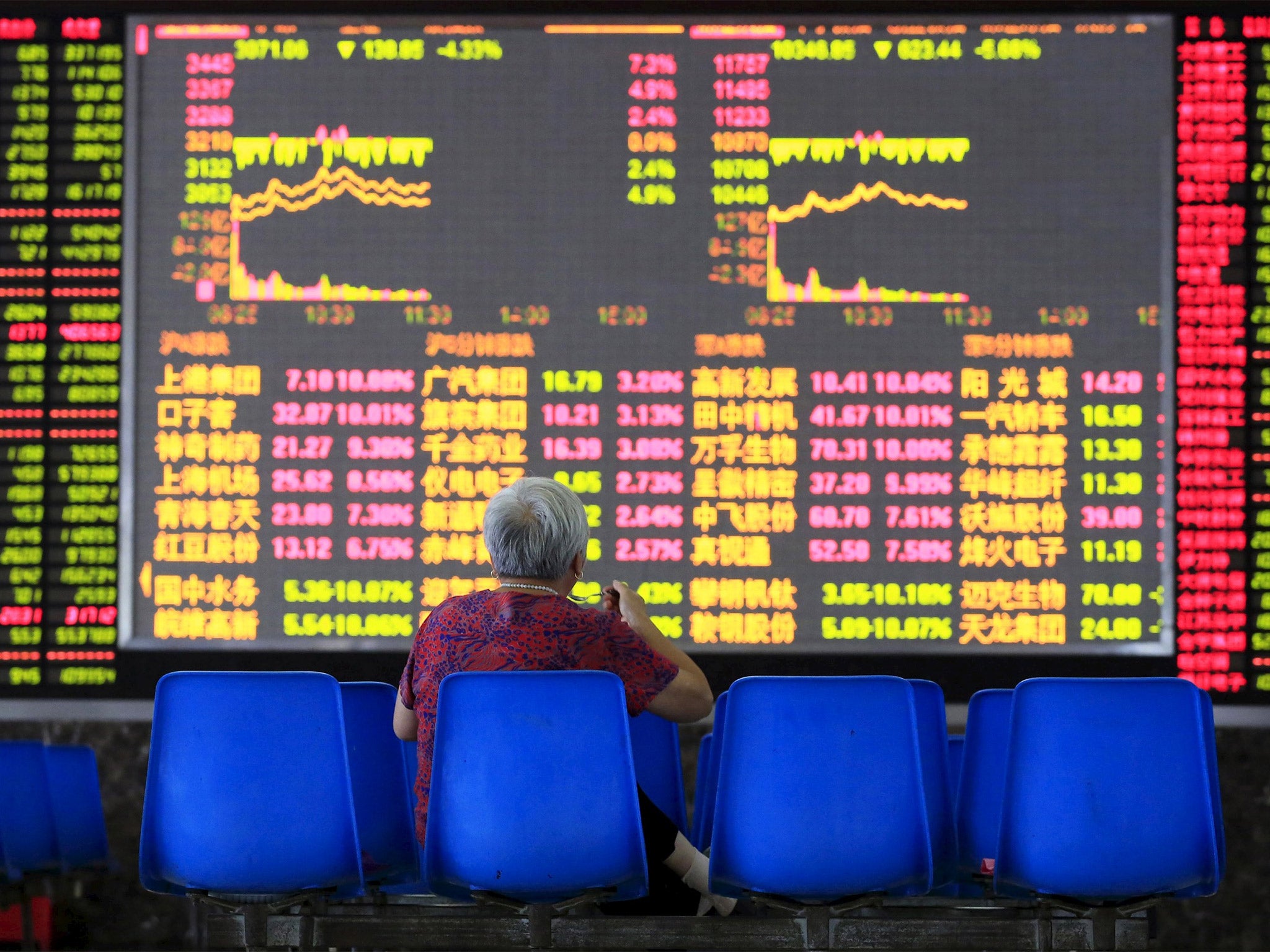Black Monday: European shares rally after China's central bank slashes lending rate
Chinese stocks plummeted by 7.6%, following the 8.5% rout on 'Black Monday'

The free-falling Chinese stock market and growing fears about the health of the world’s second-largest economy prompted the “panicking” Beijing authorities to slash interest rates and boost domestic bank lending yesterday.
After Chinese stocks plummeted by another 7.6 per cent, following the 8.5 per cent rout on “Black Monday”, the People’s Bank of China moved to staunch the bleeding by announcing a cut in the benchmark lending rate by 0.25 percentage points to 4.6 per cent. The central bank also reduced its “reserve ratio requirement” for large banks, which should enable them to lend more money to cash-strapped firms.
News of Beijing’s monetary relaxation gave an immediate fillip to European shares, sending the FTSE 100 up 3.09 per cent, erasing much of the severe losses suffered by the benchmark index of UK-listed shares on Monday. In America shares were up sharply for much of the day before sell orders in the final 15 minutes saw it end 200 points – or 1.3 per cent – down, extending Wall Street’s losing streak to six days.
Stock markets in France and Germany closed higher. The price of global commodities – for which China is one of the world’s biggest customers – was also lifted. The price of a barrel of oil rose 2.3 per cent to $43.62 while the copper price was up 2.1 per cent.
Speaking about the turmoil in global financial markets and the threat of a sudden slowdown in China yesterday, the Chancellor, George Osborne, said the UK economy was “much better-prepared than we would have been a few years ago for this kind of shock” – arguing it was evidence for the need to continue with the UK’s deficit reduction to “put our own house in order”.
But Labour said he was turning a blind eye to the potential damage that a “hard landing” for the Chinese economy could have. “The Chancellor is too complacent about the impact a slowdown” said Chris Leslie, the shadow Chancellor.
Wang Tao of the investment bank UBS predicted Beijing’s latest monetary easing would “help shore up sentiment in markets”. But other analysts argued the move was primarily designed to support the Chinese economy, rather than the country’s stock market.
“The change of tack may signal that policymakers have finally conceded that their efforts to determine prices are futile,” said Mark Williams of Capital Economics. Others suggested that the move indicated rising panic among the authorities in China about the state of the economy. “This is a big-bang move... Frankly [it] shows a bit of panic in my mind,” said Andrew Polk of the Conference Board in Beijing.
The Chinese authorities are targeting GDP growth of “around 7 per cent” this year. In 2014 growth slowed to 7.4 per cent – the weakest since 1990 – and some analysts believe that economy is performing worse than the official figures imply.
“China’s economic growth is still facing downward pressure, and the task of stabilising growth… and preventing risks is still extremely arduous,” the Beijing-based central bank said in a statement after markets had closed after another day of bloodletting.
“Global financial markets have also recently displayed relatively large fluctuations, and there is a need for more flexible use of monetary policy tools and for the creation of a monetary policy environment that is more conducive to economic restructuring.”
Chinese stocks went on a colossal bull run in the summer of 2014, with shares rising by 150 per cent over the next year, as small investors borrowed money and ploughed the proceeds into the country’s equities market. As of yesterday night Chinese stock prices were down 44 per cent since the bubble burst in June.
The authorities have enacted a range of measures in an attempt to prop up the stock market since the bubble burst in June, including ordering financial firms to buy up shares and commanding the state media to talk up the market. But prices have nevertheless continued sliding. Now the focus has moved to measures designed to prop up the economy more broadly. Earlier this month China devalued its currency by 4 per cent in two days – a move widely interpreted as an attempt to help its export sector. Beijing’s rate cut yesterday represents the central bank’s fifth reduction in the cost of borrowing for the country’s economy since last November.
Subscribe to Independent Premium to bookmark this article
Want to bookmark your favourite articles and stories to read or reference later? Start your Independent Premium subscription today.

Join our commenting forum
Join thought-provoking conversations, follow other Independent readers and see their replies